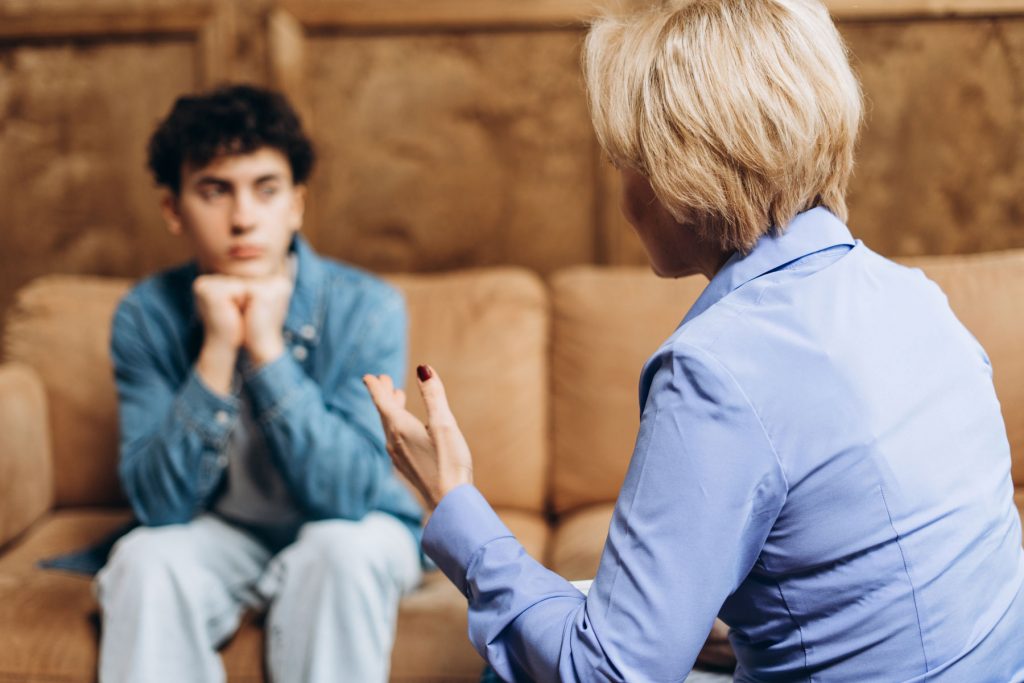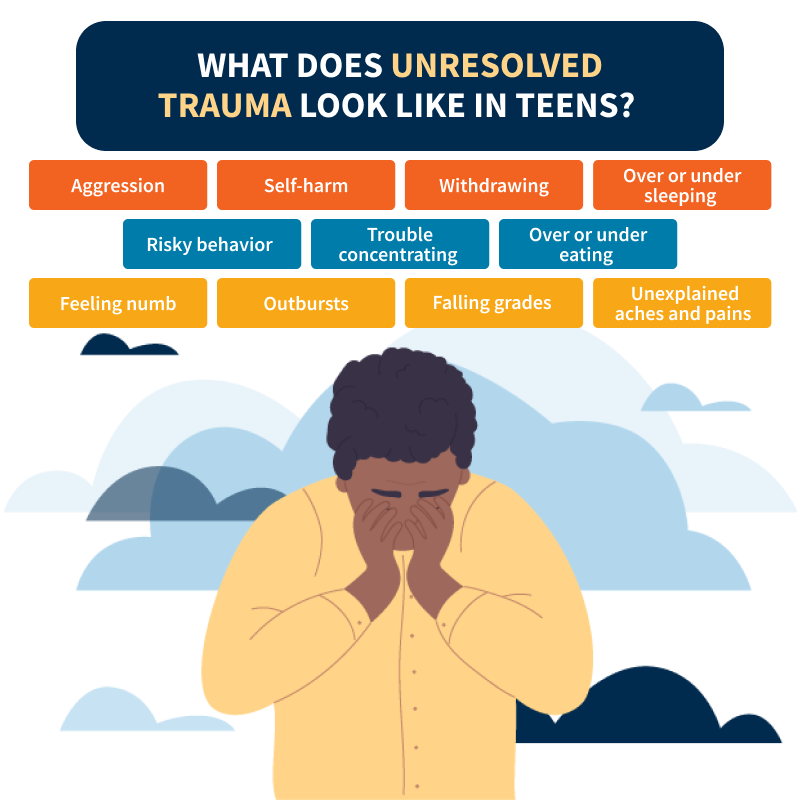Living with unresolved trauma can be challenging and overwhelming. It can affect every aspect of your life, from your relationships to your physical and mental health. These effects can be even more profound in teens. If you’ve noticed behavioral changes in your child, they might be living with the effects of trauma. Teen trauma treatment can help them process their experiences and move forward.
What is trauma?
There are two primary types of mental trauma: complex and acute. Complex trauma occurs as a result of ongoing, repeated traumatic experiences, such as physical or emotional abuse, unintentional chronic stress, or neglect. On the other hand, acute trauma is caused by one-time events like natural disasters, accidents, or violent incidents.
Trauma can have different effects on individuals depending on their age and developmental stage. For teenagers specifically, unresolved trauma can often manifest in behavioral changes such as aggression, withdrawal, or self-destructive behavior. These changes can also impact their relationships with family and friends, as well as their academic performance.
How trauma affects the brain and body
Whenever someone experiences trauma, it changes how their brain perceives threats and how they’ll both physically and emotionally react. Trauma can physically change the structure of some parts of the brain, including:
- The amygdala, which helps regulate emotions
- The hippocampus, which helps with memory
- The prefrontal cortex, which helps with decision-making
When these areas of the brain change, people who experienced trauma can have a hard time regulating their emotions and might have outbursts. They can have issues remembering things and even creating new memories. And they might have a hard time making rational, healthy decisions. Some people with trauma also experience headaches, chronic pain, and/or stomach issues, all of which can be caused by stress.
What happens if trauma is left untreated?
The teenage brain is still in the process of maturing, making it particularly vulnerable to the effects of trauma. When a teen experiences trauma, it can disrupt normal brain development and function. This impact on the brain can lead to cognitive, emotional, and behavioral changes, such as difficulties in concentration, heightened emotional responses, and increased risk-taking behaviors.
Trauma, especially that caused by adverse childhood experiences doesn’t just change the way people learn to experience emotions or interact with other people during adolescence. Without treatment to resolve their trauma and learn how to cope with their mental health, they might carry these behaviors into adulthood. That means that they might cope in unhealthy ways, like self-medicating with drugs or alcohol, staying in toxic relationships, isolating and withdrawing away from others, or self-harming.
What does unresolved trauma look like?
Recognizing the signs of unresolved trauma in your teen is the first step toward helping them heal. These signs may include changes in their behavior, mood, or academic performance, or others, like:
It is important to note that these signs may not always be indicative of unresolved trauma, and it’s essential to seek professional help for a proper diagnosis.
Treating trauma in teens
Treatment for trauma in teenagers needs to be tailored to their specific needs. Trauma-focused cognitive-behavioral therapy (TF-CBT) is usually one of the first types of therapy recommended, as it’s a way to help teens process their traumatic memories and reduce their symptoms. Some teens also benefit from eye movement desensitization and reprocessing (EMDR) therapy, which uses bilateral stimulation (like having a teen lightly tap both sides of their head) while discussing traumatic memories so they can work on resolving them.
Other methods include:
- Experiential therapy: Activities such as art, music, or outdoor experiences can help teens express and process their emotions
- Group support: Connecting with others who have experienced similar traumas provides a sense of community and support for teens
- Psychiatric support: In some cases, medication may be prescribed to help manage symptoms related to trauma, such as depression or anxiety
Family support plays a crucial role in the healing process. Parents must take part in the healing process, understanding how they may have played a role in their child’s trauma and how to make changes and support them moving forward.
Self-care and family support
If your teen is living with unresolved trauma, finding them professional support is one of the best things you can do for them. By processing their experiences in a safe, controlled environment, they can start working through their past so they can have a healthier future. There are also things you can do at home, though, that can support what they learn in treatment.
- Predictable routines: Living with trauma can leave people feeling on-edge and uncertain. Having some things be routine can help them regain a sense of control.
- Sleep hygiene: Going to bed can be a nightmare (literally) for people with trauma. Relaxing before sleep, limiting screen time, and being consistent can make it more approachable.
- Exercise: Movement can help reduce stress and even improve mood. Going for walks, joining a team, or even starting a class are all good ways to get started.
- Mindfulness and relaxation: Physical relaxation is truly effective in helping calm down the mind. Yoga and meditation are both great practices that are beginner friendly.
- Validating emotions: Trauma is isolating, and people who experience it often live with a lot of guilt and shame. Giving your teen space to feel how they feel is a good start.
Taking care of yourself is also something you’ll need to make a priority. Showing up for them requires you to show up for yourself. You can bring your teen into your self-care routine, too, to show them how you’re working on things, just be sure to keep some space just for yourself.
A note about adoption and trauma
Children who are adopted through foster care or institutional systems are often at a higher risk of being exposed to neglect, deprivation, and abuse. These adverse experiences can make the adoption process itself even more challenging for children—especially if the adoption occurs closer to adolescence.
Without proper education and understanding of how adoption affects children, adoptive parents may not be as effective in creating a caregiving environment for their adopted children, according to some research. If you’ve adopted a child, keeping an open mind about what they may have been exposed to before you were in their life—and watching for symptoms of trauma—will help you provide them with the support they need.
Call Family First for help now
We know that watching your teen struggle with the effects of unresolved trauma can be difficult. At Family First, we provide adolescent trauma therapy to help your teen heal and thrive. Our team has more than 120 years of combined clinical experience and is dedicated to providing individualized care and support for teens and their families. Contact us online or call 888.904.5947 now to find the help your teen needs to heal from the past and become excited about the future.


